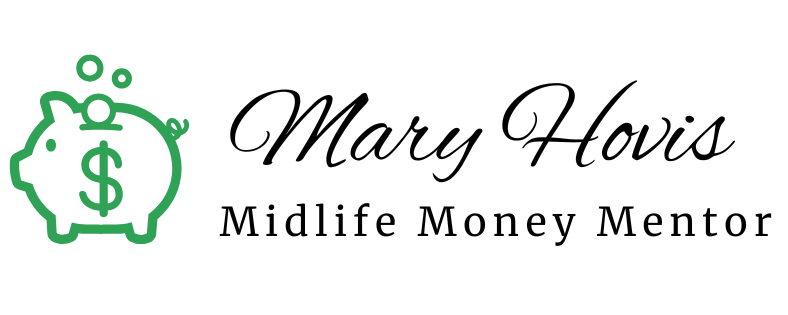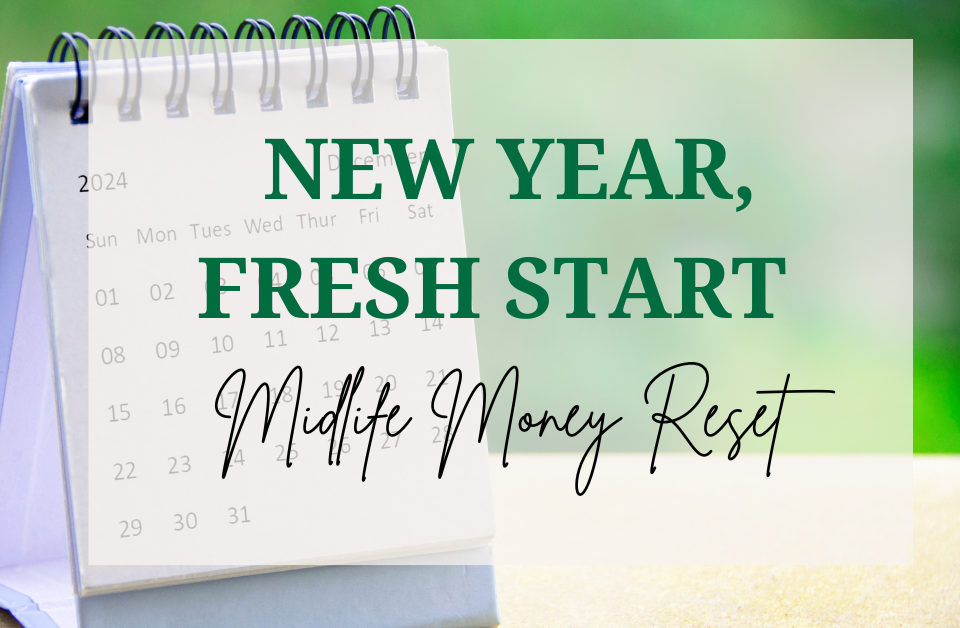“I’ve made the same financial resolutions every January for the past decade,” Sarah shared during a recent coffee chat. “Save more, spend less, worry less, but it never happens. This year feels different—maybe because I’m finally ready to put myself first.”
Her words resonate with so many as we step into 2025 and reflect on the importance of financial planning for midlife women. Do you feel it, too? Is it finally time to take charge of your financial goals?
The Problem: Living Reactively vs. Living Proactively
If you’re like most women I work with, you’ve spent years navigating your finances in reactive mode—responding to crises as they arise, juggling unexpected expenses, and hoping there’s enough left at the end of the month to save something.

You likely have good intentions for your finances, but problems arise when you lack a solid plan to address life’s realities, causing those intentions to fall by the wayside.
Living reactively often leads to debt, disorganized finances, a lack of financial clarity and knowledge, overwhelming feelings about money, and inadequate savings. It’s exhausting and not a sustainable way to build a secure future. Now is the time to shift from reactive mode to a proactive, intentional approach to your finances.
Caught in Reactive Mode
How much of your financial decision making is on autopilot? Being proactive with your finances isn’t just a checklist of tasks; it’s a mindset shift. It involves examining your life, identifying what commonly derails you, and exploring options before a crisis hits. It’s about addressing the root causes of your money issues at their core.
This may sound daunting, but it’s simpler than it seems. It means becoming a student of your life and anticipating situations that could challenge you financially, such as a car repair bill, a broken heater on the coldest day of the year, or an unexpected hospitalization of a coworker. Life will throw curveballs, and while you can’t predict every challenge, you can prepare for the unexpected.
Starting the New Year Where You Are (Without Shame)
When faced with a financial emergency, do you react in ways that could have negative consequences? Do you avoid opening the mail, not checking bills, asking to borrow from family members once again, or try tapping into home equity or retirement savings?

Let’s be honest: confronting your finances can trigger complex emotions, especially in midlife. Whatever your starting point, shame has no place in your plan for this year! Instead of dwelling on past mistakes, commit to doing better and taking the necessary steps to become more proactive in your financial life.
Jen’s Cold Reality: The Price of Living Without a Plan
Consider Jen, whose furnace broke down during a forecasted cold snap. It cost her nearly $2,500 to restore heat. Unfortunately, she had to finance the repair at a high interest rate, increasing her monthly payment and diminishing her ability to save for an emergency fund.
Jen knew this repair was coming but didn’t address it until it became a crisis. During her last inspection, the serviceman had recommended replacing her furnace. Last summer, she could have taken advantage of a zero-percent financing offer to replace the entire system for about $4,500, with better payment terms than just the repair.
It’s easy to see where Jen went wrong. When it’s someone else’s story, her mistakes can seem so obvious. It’s harder to have the same clarity when it’s personal. Think about your own life. Have you found yourself in a similar situation? I know I have.
Digging Down to Root Causes
Let’s identify the root causes that put Jen in this predicament:
- Lack of emergency savings: Jen didn’t prioritize building an emergency fund and had no savings account to rely on.
- Lack of options: Unprepared, she was at the mercy of whatever choices the HVAC company provided. With no choice but to get the repair done, she couldn’t negotiate the total cost, ask for a cash discount, or shop around.
- Excess spending on luxuries: While it’s nice to treat yourself to hair and nail appointments or takeout dinners, when these luxuries become routine and leave you unprepared for emergencies, it’s time for a change.
- Ignoring the problem: Jen tends to avoid uncomfortable decisions. Plus, she didn’t know how she could afford the extra expense, of a new furnace.
Now is the perfect time for Jen to recognize these patterns and plan ahead to handle them more effectively in the future.

The Solution: Preplan to Be Prepared
You will inevitably face home maintenance and repairs, car issues, and other surprise expenses. The key is to prepare for something to go wrong. Reflect on challenging financial situations you’ve encountered and how you responded. Note any negative consequences stemming from your reactionary behavior, then brainstorm ways to be more proactive when emergencies arise.
Here are some ideas to consider:
- Set up an emergency savings account of $1,000–$2,000.
- Start a car maintenance fund or a home maintenance fund.
- Allocate $20–$50 from each paycheck into a discretionary fund.
- Network with others to find trusted advisors in your life.
- Cultivate a good friend to be your go-to sounding board for difficult decisions.
- Identify and acknowledge unhealthy coping habits.
- Research common home and car maintenance issues.
- Create a list of recommended repair professionals, mechanics, or handypersons.
By mentally rehearsing potential surprises in advance, you save time, energy, money, stress, worry, and uncertainty later on. Let the results of your brainstorming guide you from knowing to doing. What’s one action you can take right now?
Maybe consider setting up an emergency fund. A healthy emergency fund can provide a cushion when unexpected expenses arise.
Your Fresh Start
Forgive yourself for past mistakes, acknowledge them, and find ways to improve. Make 2025 your year for a financial fresh start, and the year you finally transition your finances from chaos to clarity!
So, what will your financial intention be for 2025? Whether it’s creating an emergency fund, paying off debt, or saving for a dream, I’d love to hear your story. Share it in the comments—your journey could inspire someone else to take their first step toward financial empowerment.
Here’s to a year of purpose, preparation, and progress!







